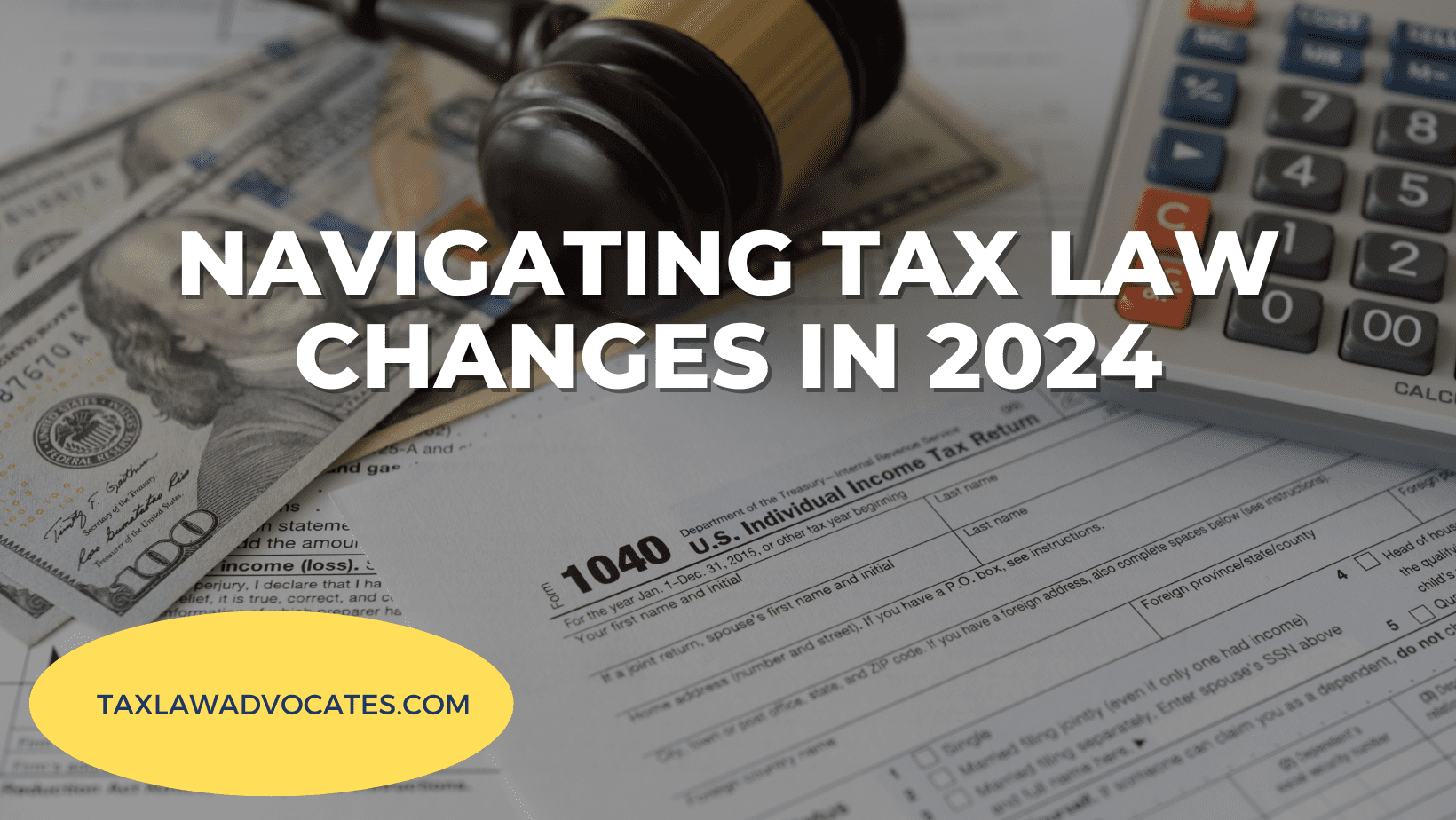The tax landscape is constantly evolving, and 2024 brings a variety of changes that could significantly impact taxpayers. Whether you’re a business owner, an employee, or a retiree, understanding these changes is crucial for optimizing your tax strategy. At Tax Law Advocates, we are dedicated to helping you navigate these updates so you can maximize your savings and stay compliant with the law.
In 2024, the IRS has made several adjustments in response to inflation, including higher standard deductions, adjusted tax brackets, and increased contribution limits for retirement accounts. These changes will affect how much you owe and how much you can save. Here’s a closer look at the major tax law updates and what they mean for you.
1. Standard Deduction Increases for 2024
The standard deduction is one of the simplest ways to lower your taxable income, and it’s often more convenient than itemizing deductions. The IRS has increased the standard deduction for all filing statuses, which will allow many Americans to keep more of their income.
– For married couples filing jointly, the standard deduction rises to $29,200, an increase of $1,500 from 2023.
– For single taxpayers, the deduction increases to $14,600, a $750 rise from the previous year.
– For heads of households, the standard deduction will be $21,900, up by $1,100 from 2023.
For example, if you’re a single filer earning $50,000 in 2024, your taxable income could be reduced to $35,400 just by taking the standard deduction.
2. Tax Bracket Adjustments for 2024
One of the most significant changes this year is the adjustment to tax brackets. These adjustments could mean that taxpayers will owe less than anticipated.
Here’s a breakdown of the new 2024 tax brackets for single and married taxpayers filing jointly:
|
Tax Rate |
Single Taxpayers | Married, Filing Jointly |
|
37% |
Incomes greater than $609,350 |
Incomes greater than $731,200 |
|
35% |
Incomes greater than $243,725 |
Incomes greater than $487,450 |
|
32% |
Incomes greater than $191,950 |
Incomes greater than $383,900 |
|
24% |
Incomes greater than $100,525 |
Incomes greater than $201,050 |
| 22% | Incomes greater than $47,150 |
Incomes greater than $94,300 |
| 12% | Incomes greater than $11,600 |
Incomes greater than $23,200 |
| 10% | Incomes of $11,600 or less |
Incomes of $23,200 or less |
For instance, if you earned $46,000 in 2023, you were taxed at 22%. In 2024, that same income falls into the 12% bracket, which could result in a substantial reduction in your tax liability.
3. Retirement Plan Contribution Limits Rise
Planning for retirement is essential, and 2024 brings higher contribution limits for tax-advantaged retirement accounts like 401(k)s, IRAs, and 403(b)s. These increases allow taxpayers to save more while enjoying tax benefits.
– The contribution limit for 401(k) and 403(b) plans increases to $23,000 in 2024, up from $22,500. Employees aged 50 and over can contribute an additional $7,500, making the total contribution limit $30,500.
– For IRAs, the limit rises to $7,000 for taxpayers under 50, and $8,000 for those 50 and older. This is up from $6,500 and $7,500, respectively, in 2023.
These changes offer a fantastic opportunity to boost your retirement savings while reducing your taxable income.
4. Expanded Earned Income Tax Credit
The Earned Income Tax Credit (EITC) is designed to help low- and moderate-income workers reduce their tax liability. In 2024, the income thresholds and maximum credit amounts have been updated, making more taxpayers eligible for this benefit.
Here’s a summary of the EITC changes for 2024:
|
Dependents |
Maximum Possible Credit | Income Limit for Single/Head of Household | Income Limit for Married Filing Jointly |
|
0 |
$632 | $18,591 |
$25,511 |
|
1 |
$4,213 | $49,084 |
$56,004 |
|
2 |
$6,960 | $55,768 |
$62,688 |
|
3+ |
$7,830 | $59,899 |
$66,819 |
If you’re unsure whether you qualify for the EITC, working with a tax professional, like those at Tax Law Advocates, can help you determine your eligibility and maximize your refund.
5. Updates to Capital Gains and Kiddie Tax
The capital gains tax threshold for 2024 has increased, allowing more taxpayers to avoid paying taxes on capital asset sales. Taxpayers with a total taxable income of $47,025 or less won’t owe capital gains tax. This threshold increased from $44,625 in 2023. For those earning more, the rate is 15% for income up to $518,900 and 20% above that.
Additionally, changes to the kiddie tax affect how a child’s unearned income is taxed. In 2024, the first $1,300 of unearned income is tax-free, the next $1,300 is taxed at the child’s rate, and anything above $2,600 is taxed at the parents’ rate. This can impact families with investment income, and understanding these updates is crucial for minimizing tax liability.
6. Other Notable 2024 Tax Changes
Several other tax changes could affect your financial planning in 2024:
– The maximum tax credit for adoption expenses has increased to $16,810, up from $15,950 in 2023.
– The gift tax exclusion rises to $18,000, up from $17,000 last year, allowing more flexibility for gifting without incurring taxes.
– The threshold for foreign-earned income exclusion rises to $126,500 for 2024, making it easier for Americans working abroad to exclude foreign income from U.S. taxation.
How Tax Law Advocates Can Help
While these tax changes can benefit many taxpayers, navigating them can be complex. Working with a tax professional ensures you stay compliant with the law while maximizing your deductions and credits. At Tax Law Advocates, we specialize in helping individuals and businesses manage their tax obligations, offering personalized advice and guidance to optimize your tax strategy.
Whether you need help understanding your tax bracket, optimizing your retirement savings, or qualifying for the Earned Income Tax Credit, Tax Law Advocates is here to assist you. We stay up-to-date with all tax law changes so you can focus on your financial goals.
As you prepare for the 2024 tax season, don’t leave your tax strategy to chance. Let the experts at Tax Law Advocates guide you through the changes and ensure you’re taking advantage of all the available deductions, credits, and savings opportunities. Call Tax Law Advocates today at 855-612-7777 or visit our website to schedule a consultation and start planning for a successful financial future.






